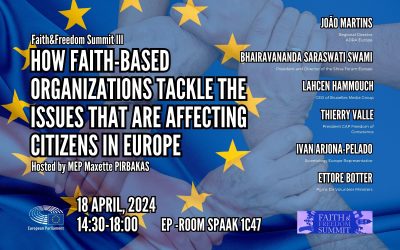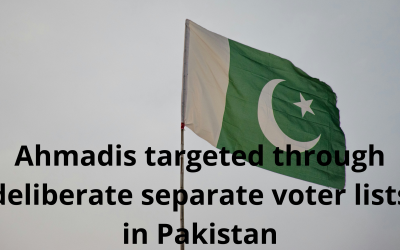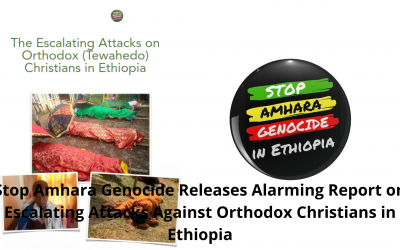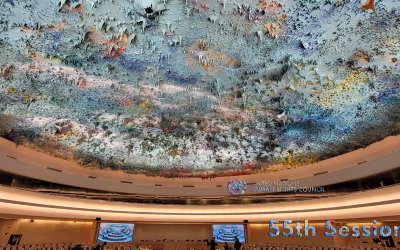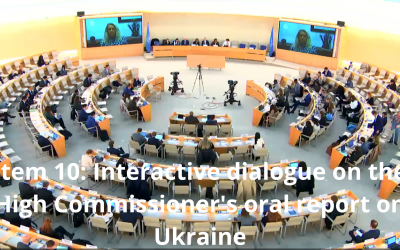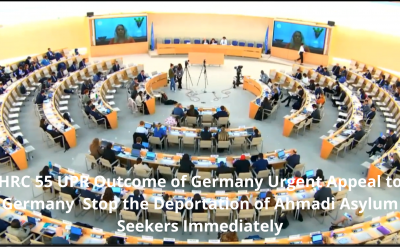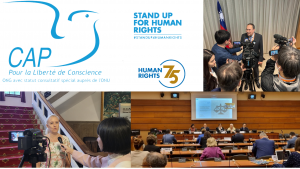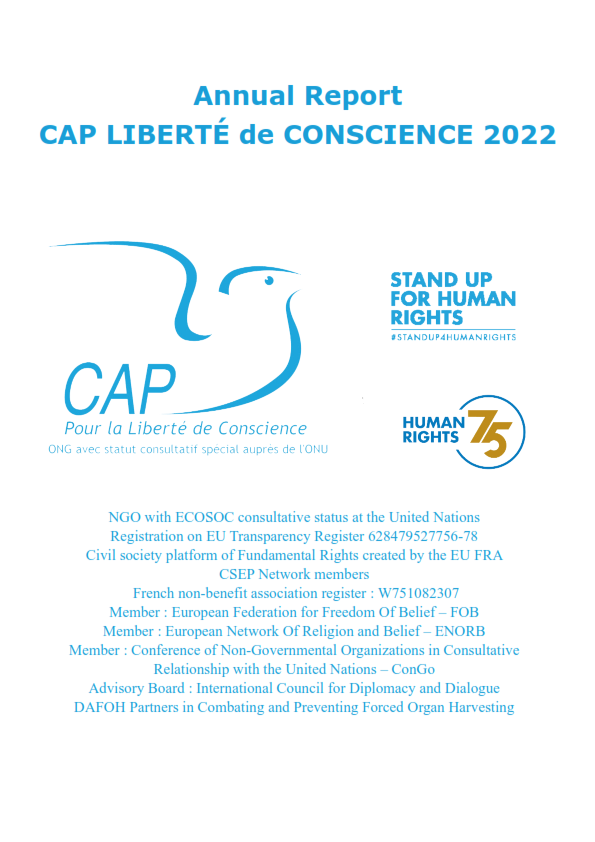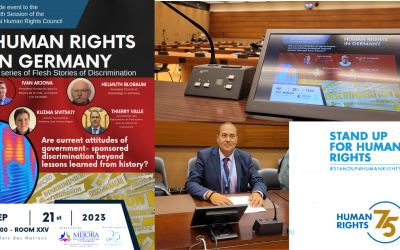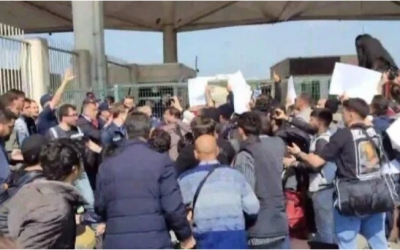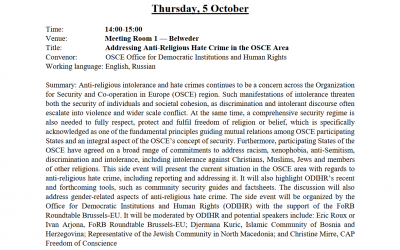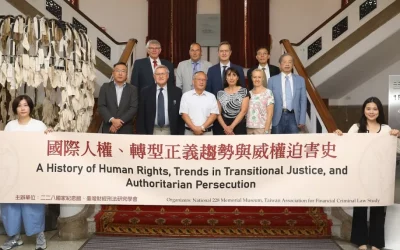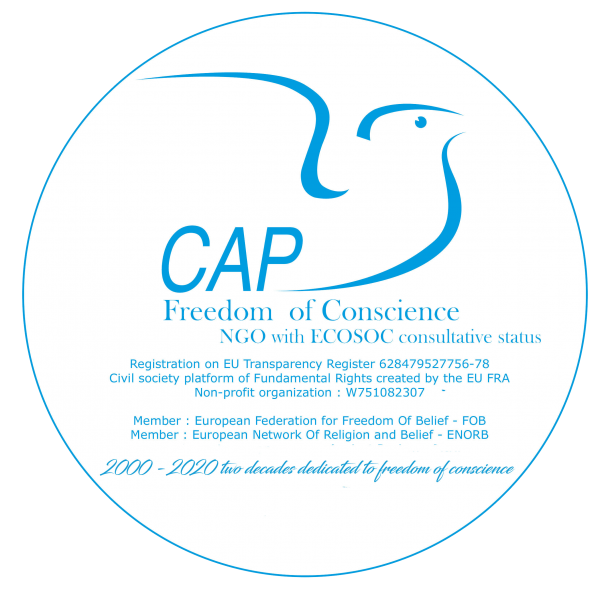
What is “Coordination des Associations et des Particuliers pour la Liberté de Conscience” (CAP Freedom of Conscience)?
CAP Freedom of Conscience is a secular European NGO with United Nations Consultative Status, created in 1995 and dedicated to protect the Right of Freedom of Religion and Belief.
CAP Freedom of Conscience combats all forms of discrimination based on religion or belief by alerting European and International bodies.
CAP Freedom of Conscience collects testimonies of discrimination and human rights violations affecting religious or belief communities in order to disseminate them to international bodies, and in order to raise awareness and inform them as well as to generate debate on the protection of Freedom of Religion and Belief.
CAP Freedom of Conscience also advocates for any religious or spiritual group facing discrimination to have their right to Freedom of Religion and Belief recognized.
CAP Freedom of Conscience is a member of the European Federation for Freedom of Belief (FOB), European Network Of Religion and Belief (ENORB) and participate to the Civil Society Platform of Fundamental Rights created by the EU Fundamental Rights Agency DAFOH Partners in Combating and Preventing Forced Organ Harvesting
Social Impact of Faith-Based Organizations in Europe
FBO’s play a significant role in addressing societal challenges, promoting social cohesion, and advocating for the values of faith and freedom in the European Union (EU). This conference aims to provide a platform for MEPs and Civil Society to discuss the challenges, opportunities and impact of FBOs and their contributions to a more inclusive and sustainable society inside Europe.
Ahmadis targeted through deliberate separate voter lists in Pakistan
The Coordination des Associations et des Particuliers pour la Liberté de Conscience (CAP LC) and the International Human Rights Committee (IHRC) have been alerting the international community for years about the persistent persecution of the Ahmadiyya Muslim community in Pakistan. The latest press release from the IHRC highlights the alarming situation where the Pakistani government, in collaboration with local officials, has implemented a discriminatory practice of creating separate voter lists for Ahmadi citizens. This tactic aims to expose and target the Ahmadiyya community, leading to further discrimination and violence against them.
Stop Amhara Genocide Releases Alarming Report on Escalating Attacks Against Orthodox Christians in Ethiopia
Stop Amhara Genocide, a human rights organization dedicated to raising awareness about the ongoing Amhara genocide in Ethiopia, has released a comprehensive report detailing the escalating attacks on Orthodox Christians in the country. The report, titled “The Escalating Attacks on Orthodox Christians in Ethiopia,” sheds light on the systematic persecution, violence, and discrimination faced by adherents of the Ethiopian Orthodox Tewahedo Church, one of the oldest Christian denominations in the world.
UN Human Rights Council Draft Resolution Calls for Strengthened Protection of Minority Rights
The United Nations Human Rights Council is currently considering a draft resolution (A/HRC/55/L.22) that aims to bolster the rights of persons belonging to national, ethnic, religious, and linguistic minorities. The resolution, sponsored by a diverse group of countries, emphasizes the need for States to take concrete measures to ensure the full enjoyment of minority rights and promote social cohesion.
Oral declaration : Item 10: Interactive dialogue on the High Commissioner’s oral report on Ukraine
At the 55th session of the Human Rights Council, CAP Liberté de Conscience and Human Rights Without Frontiers will raise the alarming issue of approximately 20,000 Ukrainian children who have been forcibly transferred from occupied Ukrainian territories to Russia. Despite the efforts of NGOs and the mediation of Qatar, which have led to the rescue and reunification of only a few hundred children with their families in Ukraine, the scale of this crime against humanity remains staggering.
HRC 55 UPR Outcome of Germany Urgent Appeal to Germany Stop the Deportation of Ahmadi Asylum Seekers Immediately
The Coordination of Associations and Individuals for Freedom of Conscience (CAP LC) has issued an urgent appeal to the German government during the 55th session of the Human Rights Council, urging an immediate halt to the deportation of Ahmadi asylum seekers to Pakistan. This call for action was made following the review of Germany’s Universal Periodic Review (UPR) outcome on 22 March 2024.
CAP Freedom of Conscience involvement in Europe
Ahmadi Muslims in Germany who’ve fled state persecution are being deported back to Pakistan and it’s putting their lives at risk
Thousands of Ahmadi Muslims in Germany who have fled severe religious persecution in Pakistan are awaiting a decision on their asylum applications. They belong to a religiously and politically persecuted minority – the Ahmadiyya Muslim Community. It is recognized around the world by human rights groups that Ahmadi Muslims are constantly, ruthlessly persecuted.
Turkish court rules in favor of 101 Ahmadi religion detainees
In a side-event of the 54th session of the Human Rights Council in Germany, director of CAP Freedom of Conscience, Thierry Valle, has delivered an oral statement emphasizing the urgent need to grant asylum/humanitarian visas to the 101 members through EU consulates in Turkey as the only way available means to safeguard their right to freedom of religion and their right to life and freedom from inhumane or degrading treatment.
Side-event of the 54th session of the Human Rights Council UN Human Rights In Germany
Since May of this year, over 100 Ahmadis from various countries where they were heavily persecuted, have been detained by the Turkish authorities in Edirne Immigration Detention Center. They want to apply for asylum in an EU country.
Those people from the Ahmadi Religion of Peace and Light do not want to stay in Turkey, another Muslim majority country, where people also consider them infidels and treat them as such.
Addressing Anti-Religious Hate Crime in the OSCE Area
Anti-religious intolerance and hate crimes continues to be a concern across the Organization for Security and Co-operation in Europe (OSCE) region. Such manifestations of intolerance threaten both the security of individuals and societal cohesion, as discrimination and intolerant discourse often escalate into violence and wider scale conflict. At the same time, a comprehensive security regime is also needed to fully respect, protect and fulfil freedom of religion or belief, which is specifically acknowledged as one of the fundamental principles guiding mutual relations among OSCE participating States and an integral aspect of the OSCE’s concept of security. Furthermore, participating States of the OSCE have agreed on a broad range of commitments to address racism, xenophobia, anti-Semitism, discrimination and intolerance, including intolerance against Christians, Muslims, Jews and members of other religions. This side event will present the current situation in the OSCE area with regards to anti-religious hate crime, including reporting and addressing it. It will also highlight ODIHR’s recent and forthcoming tools, such as community security guides and factsheets. The discussion will also address gender-related aspects of anti-religious hate crime. The side event will be organized by the Office for Democratic Institutions and Human Rights (ODIHR) with the support of the FoRB Roundtable Brussels-EU
Strengthening Freedom of Thought Conscience Religion and Belief in Yemen
Violence in Yemen in 2023 has seen an uptick , including an increase in targeted attacks and violent speech towards religious minorities. On 25th May 2023, Houthi militia stormed a peaceful meeting of Bahais in Sana’a and arrested 17, including five women, and continue to detain 11 of them incommunicado. In 2 June 2023, the UN High Commissioner on Human Rights reported how the Mufti Shamseddin Sharafeddin, appointed by leaders of the Houthi militant movement, accused the detained Bahais of being apostates and saying “they should be killed,” if they did not repent Similar hate speech and incitement has been recorded in Yemen towards Christian converts and others since the start of the conflict and was raised during the virtual 53rd Human Rights Council parallel event co-sponsored by the Slovak Republic Bureau of the Special Envoy for Freedom of Religion or Belief.
Axiom Justice Has No Time Limit Government transitional justice should not set its own limits
Whether or not transitional justice is implemented is the basic condition for examining the establishment of a human rights nation. As Christine Mire, vice president of the French CAP-LC (Coordination for Freedom of Conscience of Individuals and Organizations), emphasized, Taiwan is one of the few countries that can turn the relics of past government abuses into museums, and despite Taiwan’s commitment to democracy, the failure to solve the Taijimen case has tarnished Taiwan’s reputation as a democracy. The government should face up to the fact that Taiwan’s international reputation should be preserved.

